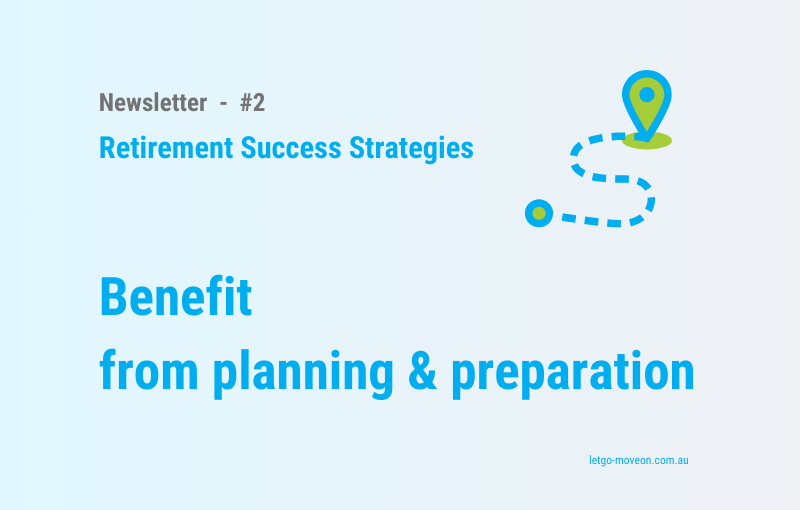This newsletter issue’s topic is strongly related to the first issue because intentional planning and preparation help a lot in letting go of retirement uncertainty.
Most retirees who say they fully enjoy their retirement life also say they thoroughly planned and prepared for it.
And most of those who currently don’t feel fulfilled and happy agree and say they regret that they didn’t invest much time and energy in the planning and preparation of their transition into retirement.
Why is that? Why is the planning and preparation for retirement such an important success factor?
Let’s explore the two types of benefits of intentional retirement planning: the practical advantages and the positive impact on our mindset and emotional well-being.
Practical benefits of preparing for retirement
Planning ahead allows us to avoid stress and uncertainty as we approach retirement and makes it easier to structure and organise our daily retirement life as we want it.
These are some examples of practical benefits:
Financial readiness
Evaluating savings, investments, and income sources helps us make necessary adjustments in advance, ensuring long-term financial security and peace of mind.
Lifestyle clarity
Identifying what we want our retirement to look like – travel, hobbies, work, volunteer work, or spending time with family, for example – helps structure our daily life purposefully.
Housing and location decisions
Deciding on living arrangements in advance – for example, downsizing, relocating, or ageing in place – prevents rushed decisions with potentially negative consequences.
Health and well-being planning
Evaluating healthcare options and insurance coverage and engagement in healthy activities and routines support a higher quality of life and health.
Decluttering and organising
Simplifying possessions, paperwork, and digital assets reduces stress, creates space and clarity, and makes daily life more manageable.
Emotional and mindset benefits of retirement planning
Beyond practical preparation, actively planning for retirement fosters a positive outlook (“I’m active and in control”) and emotional resilience (“I’m well prepared”).
It allows us, for example, to:
Feel in control and empowered
Rather than facing retirement passively, planning gives us a sense of agency over our future.
Reduce anxiety and uncertainty
Knowing what to expect and having a plan in place eases worries about the unknown.
Maintain a sense of purpose
Structuring our retirement around meaningful activities keeps us engaged and motivated.
Strengthen relationships
Preparing in advance allows us to discuss expectations with loved ones and cultivate a strong support system.
Stay active and engaged
A well-thought-out plan encourages ongoing learning, social interaction, and personal growth.
How can you enjoy the benefits of intentional planning when you are already IN retirement?
It’s never too late to make a plan – and act on it.
If you’ve already entered retirement without a structured plan, don’t worry – there is still plenty of time to create a life you enjoy. Retirement is not a rigid destination but an ongoing journey.
Start by assessing where you are now and identifying areas you would like to improve. Focusing on one or two manageable steps, such as organising your finances, exploring new hobbies, reconnecting with old friends, or setting a loose daily routine, can make a significant difference.
Approach this stage with curiosity and openness, and allow yourself the flexibility to design a life, step by step, that truly aligns with your needs and aspirations.
Example of a Retirement Preparation Plan – to help you get started
The example plan not only offers a selection of action areas you could choose from – it also reminds you of the benefits you will enjoy while you are acting:
Define your vision
-
- Practical Benefit: Helps create structure and direction for daily life, reducing uncertainty.
- Emotional Benefit: Provides a sense of purpose and excitement for the future.
Review your finances
-
- Practical Benefit: Ensures long-term financial security and prevents unexpected difficulties.
- Emotional Benefit: Reduces stress and builds confidence in financial decisions.
Organise important documents
-
- Practical Benefit: Saves time and avoids legal or financial complications.
- Emotional Benefit: Provides peace of mind knowing everything is in order.
Declutter and simplify
-
- Practical Benefit: Creates a more manageable and stress-free living space.
- Emotional Benefit: Provides a sense of clarity, spaciousness, lightness.
Plan your daily structure
-
- Practical Benefit: Keeps the day organised and fulfilling.
- Emotional Benefit: Prevents feelings of aimlessness and boosts motivation.
Strengthen social connections
-
- Practical Benefit: Prevents isolation and keeps relationships strong.
- Emotional Benefit: Enhances happiness and mental well-being.
Prioritize health and wellness
-
- Practical Benefit: Supports longevity and physical well-being.
- Emotional Benefit: Boosts confidence, self-care, self-control.
Explore new opportunities
-
- Practical Benefit: Keeps the mind sharp and engaged.
- Emotional Benefit: Encourages curiosity and personal growth.
Communicate with loved ones
-
- Practical Benefit: Avoids misunderstandings about expectations in retirement.
- Emotional Benefit: Strengthens family bonds and emotional security.
PRACTICAL TIP:
Browse these suggestions, then pick ONE action area you want to focus on now.
Remember: Even big plans can be realised – if we approach them step by step.
In the coming articles, we will discuss successful retirement planning and organisation in more detail as well as a broad range of tools and strategies that help us create the retirement life we want and love to live.

